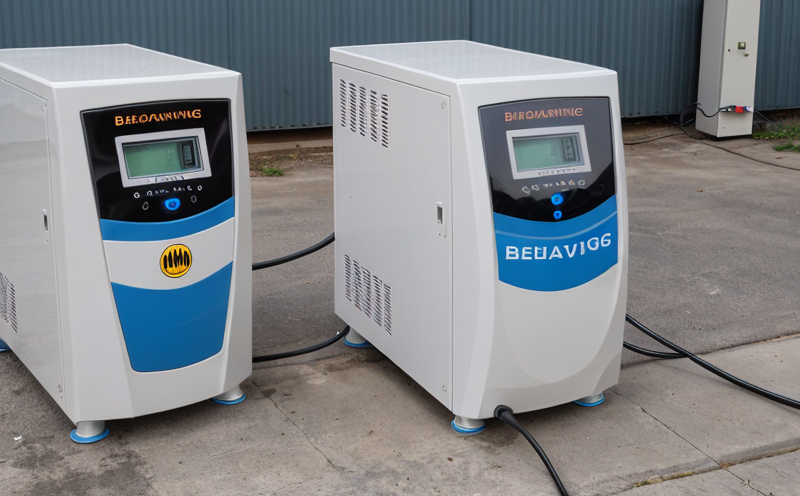SAE J2929 Charging and Discharging Behavior Testing of Lithium-Ion Batteries in EVs
The SAE J2929 test protocol is a pivotal standard for evaluating the charging and discharging behavior of lithium-ion batteries used in electric vehicles (EVs). This rigorous testing ensures that battery performance meets stringent safety, efficiency, and durability requirements. The standard covers multiple aspects such as charge termination, charge acceptance rate, state of charge estimation, and temperature monitoring during both charging and discharging processes.
The SAE J2929 protocol is particularly important for manufacturers aiming to enhance the driving range and reliability of their EV models. By adhering to this standard, they can ensure that their batteries perform optimally under a wide range of conditions, from extreme cold climates where battery capacity drops significantly to hot environments where performance degrades rapidly.
The testing protocol involves several key steps:
- Calibration and initialization of test equipment
- Setting up the initial state of charge (SOC) for each battery sample
- Performing a series of charge and discharge cycles under controlled conditions
- Monitoring critical parameters such as voltage, current, temperature, and SOC during each cycle
- Recording data from each test to ensure compliance with specified limits
The results of the SAE J2929 tests are crucial for R&D teams in identifying areas for improvement. By understanding how batteries behave under various charging and discharging conditions, engineers can optimize battery management systems (BMS) and enhance overall vehicle performance. This testing also helps in validating that the BMS accurately estimates SOC and manages power distribution efficiently.
Compliance with SAE J2929 is not only a technical requirement but also a competitive one. Customers expect EV manufacturers to deliver reliable products that meet or exceed industry standards. By adhering to this protocol, manufacturers can gain a competitive edge by offering more consistent performance and longer-lasting batteries. This reliability translates into satisfied customers who trust the longevity of their vehicles.
Furthermore, the SAE J2929 test ensures that EVs comply with regulatory requirements across different markets. As governments around the world implement stricter emissions regulations, ensuring that EVs meet these standards is essential for manufacturers to avoid costly recalls and reputational damage.
The testing protocol also plays a vital role in the quality assurance process. By conducting SAE J2929 tests at various stages of production and development, manufacturers can identify potential issues early on. This proactive approach helps minimize errors that could arise from overlooked factors such as component compatibility or improper assembly techniques.
In summary, SAE J2929 is a critical standard for ensuring the performance, safety, and reliability of lithium-ion batteries in electric vehicles. By following this protocol, manufacturers can deliver products that meet both internal quality standards and external regulatory requirements, ultimately leading to customer satisfaction and market success.
Why It Matters
The SAE J2929 test is essential for several reasons:
- Safety: Ensures that batteries operate safely under all conditions, reducing the risk of fires or explosions.
- Durability: Evaluates how well batteries withstand repeated charge and discharge cycles over time, extending their useful life.
- Performance: Helps determine the maximum range an EV can achieve on a single charge, critical for consumer confidence.
- Efficiency: Measures the efficiency of battery charging and discharging processes, optimizing energy usage in vehicles.
These factors are crucial for both manufacturers and consumers. For manufacturers, compliance with SAE J2929 ensures that their products meet international standards, enhancing market credibility and regulatory compliance. For consumers, reliable EVs mean better driving experiences and peace of mind regarding vehicle longevity and safety.
The standard also plays a role in research and development by providing a benchmark against which new technologies can be compared. By adhering to SAE J2929, manufacturers can innovate confidently while maintaining consistent performance across their product lines.
Benefits
The benefits of SAE J2929 testing are numerous and far-reaching:
- Improved Battery Life: Testing ensures that batteries are designed to last longer, reducing the frequency of replacements and extending vehicle lifespan.
- Increased Range: By optimizing charging algorithms through SAE J2929 testing, manufacturers can enhance driving range, making EVs more practical for daily use.
- Safety Enhanced: The protocol helps identify potential safety hazards early in the development process, preventing accidents and ensuring user safety.
- Regulatory Compliance: Meeting SAE J2929 standards ensures compliance with international regulations, simplifying market entry for EV manufacturers.
- Cost Savings: Early detection of issues through testing reduces the need for costly post-production modifications and recall campaigns.
- Better Consumer Trust: Consistent performance across all batteries boosts consumer confidence in EV technology, fostering brand loyalty.
These benefits translate into a more sustainable and efficient automotive industry. By investing in SAE J2929 testing, manufacturers not only enhance their product offerings but also contribute to the overall advancement of electric vehicle technology.





